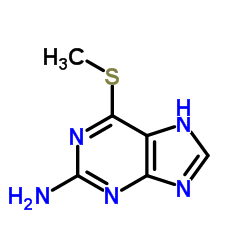6-Thioguanine and S⁶-methylthioguanine are mutagenic in human cells.
Bifeng Yuan, Timothy R O'Connor, Yinsheng Wang
文献索引:ACS Chem. Biol. 5(11) , 1021-7, (2010)
全文:HTML全文
摘要
Thiopurines are effective immunosuppressants and anticancer agents. However, the long-term use of thiopurines was found to be associated with a significantly increased risk of various types of cancer. To date, the specific mechanism(s) underlying the carcinogenicity associated with thiopurine treatment remain(s) unclear. Herein, we constructed duplex pTGFP-Hha10 shuttle vectors carrying a 6-thioguanine ((S)G) or S⁶-methylthioguanine (S⁶mG) at a unique site and allowed the vectors to propagate in three different human cell lines. Analysis of the replication products revealed that although neither thionucleoside blocked considerably DNA replication in any of the human cell lines, both (S)G and S⁶mG were mutagenic, resulting in G→A mutation at frequencies of ~8% and ~39%, respectively. Consistent with what was found from our previous study in E. coli cells, our data demonstrated that the mutagenic properties of (S)G and S⁶mG provided significant evidence for mutation induction as a potential carcinogenic mechanism associated with chronic thiopurine intervention.
相关化合物
| 结构式 | 名称/CAS号 | 分子式 | 全部文献 |
|---|---|---|---|
 |
2-氨基-6-巯嘌呤
CAS:1198-47-6 |
C6H7N5S |
|
Liquid Chromatography with Amperometric Detection at a Silve...
2015-07-07 [Anal. Chem. 87 , 6730-5, (2015)] |
|
The syntheses and properties of tricyclic pyrrolo[2,3-d]pyri...
2006-05-07 [Org. Biomol. Chem. 4(9) , 1723-9, (2006)] |
|
Reference intervals for thiopurine S-methyltransferase activ...
2004-07-01 [Ann. Clin. Biochem. 41(Pt 4) , 303-8, (2004)] |
|
Effects of various 2-amino-6-alkyldithiopurines on brain spe...
1984-06-01 [Biochem. Pharmacol. 33 , 1737-1739, (1984)] |
|
Role of postreplicative DNA mismatch repair in the cytotoxic...
1996-08-23 [Science 273(5278) , 1109-11, (1996)] |